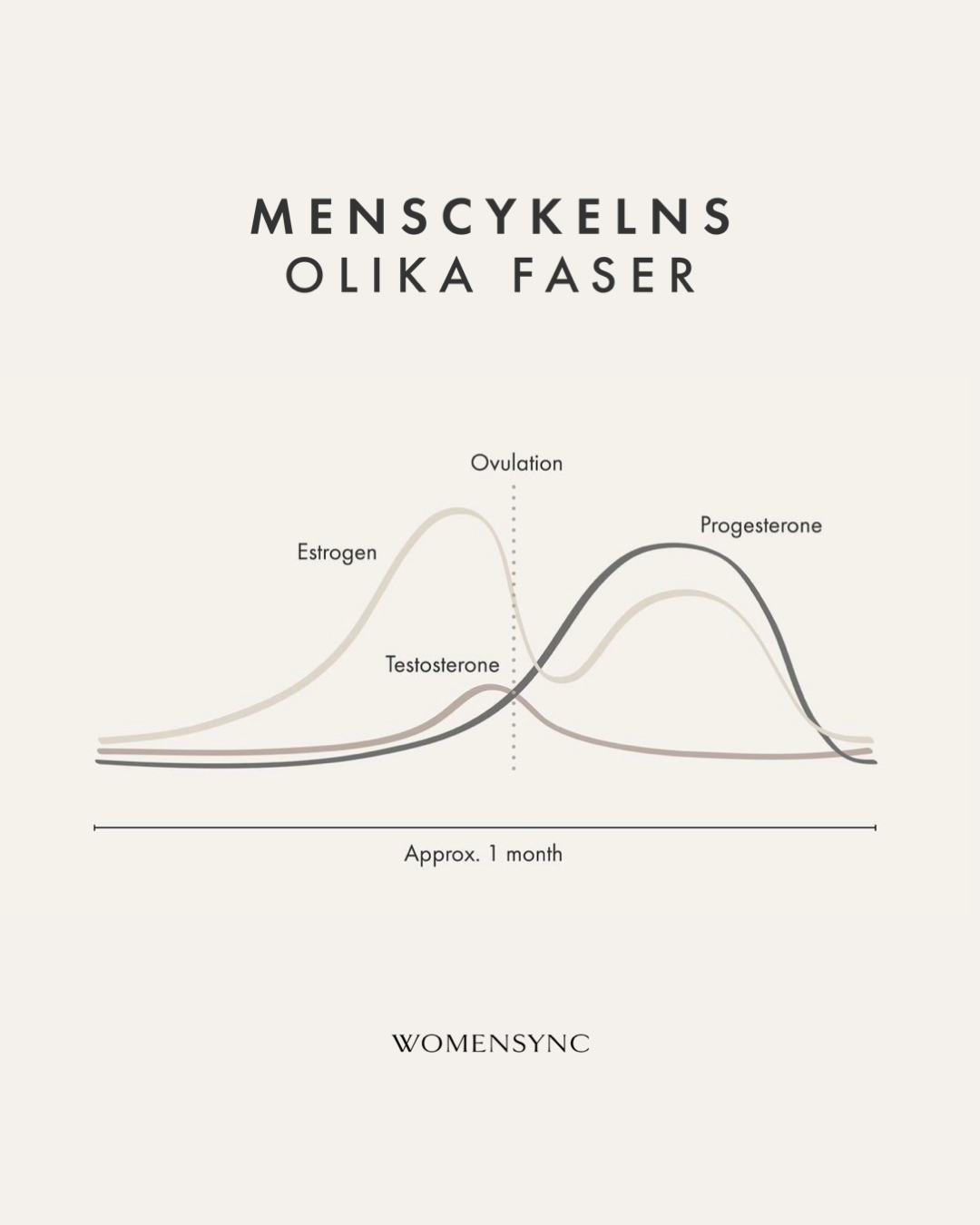Do you recognize yourself in the fact that your feelings, cravings and what you are drawn to shift during the course of the month? Hunger and cravings can vary, how the body feels, that the training feels different light or heavy depending on the week? Perhaps you also recognize that feelings can shift and that you can feel a greater need and urge to be social in one phase while in the next you want to spend time for yourself? If, like us, you recognize yourself, it's a natural part of being cyclical.
In this post, we wanted to guide you through the three phases of the menstrual cycle and how you can optimize your lifestyle based on these to feel as good as possible, every day. It doesn't matter if you have challenges or discomforts connected to the menstrual cycle or if you are passionate about personal development and want to understand yourself better. The insights provide tools for anyone with a female biology.

Phase 1 of the menstrual cycle
The first phase falls during the period, i.e. from the first day of the period to the last day of the period. The number of days with a period varies from person to person and often from menstrual cycle to menstrual cycle. The hormones are at their lowest at the beginning of the period, which also reflects how we can feel physically and emotionally in phase one.
It is not unusual to feel a little more tired at the beginning of the period - it is connected to the processes that take place in the body in connection with the period. The energy will increase as the days go by. In tandem with this (as an effect of elevated estrogen), you can feel how new ideas are awakened and that you are more easily filled with a drive to want to realize them. Phase one can thus be used as a perfect time to start new habits or projects!
Tips in phase 1
- Set aside time to take care of yourself at the beginning of the phase.
- Use physical activity to reduce any symptoms and increase your well-being.
- Use the energy that rises within you for a fresh start or to initiate change.
- Schedule presentations, meetings and social activities for the end of the phase to get the most out of your capacity.

Phase 2 of the menstrual cycle
Phase two occurs from the last day of the period until ovulation, which usually occurs around day fourteen of a twenty-eight-day cycle. If you have a shorter cycle, it happens earlier and if you have a longer cycle, it happens later.
During this phase, estrogen increases, which peaks during ovulation. Estrogen makes you experience higher energy, feel more social and you can experience a biological confidence boost. The hormone testosterone also peaks during the end of this phase, which also means that you can feel extra strong, persistent and light in your body. Given that the body is biologically set to try when you are fertile in the days before and during ovulation, it is common to want to be close to other people physically. It is therefore during this phase that the so-called "fertile window" is open and when you can get pregnant.
Tips in phase 2
- Utilize your physical capacity by challenging yourself physically.
- Dare to push yourself outside your comfort zone , this is when it feels easiest.
- Use your high energy to be productive. Be a "doer".
- Take the opportunity to socialize and network when you are most outgoing.
- Schedule a date with your partner or someone you are attracted to.
- Schedule time for recovery to maintain balance over the long term.

Phase 3 of the menstrual cycle
Phase three begins the day after ovulation until the next period and this is when the hormones shift the most. This can be reflected in the physical, emotional and mental fluctuations that one can experience in this phase. If your hormones are out of balance, you can feel like life is playing tricks one day and want to throw the bike in the ditch the next. Feel on top of the world and the next day feel down. Maybe you recognize yourself? If you do, remind yourself that it's just your hormones. This will pass.
It is thus in phase three that you can experience various PMS symptoms that can be expressed both physically and emotionally. Unlike phase two when you can feel more extroverted, now this often shifts from the outside to the inside. Perhaps you feel a greater need to spend time alone or with people close to you. Therefore, it is a perfect time to engage in personal development and activities that require emotional presence, such as meditation, writing and creation. Here one can tend to want to dive deep into details and get swallowed up in flow.
Tip phase 3
- A perfect time for personal development. Make time for yourself to reflect, read or write.
- Set aside time for emotional uplift. Plan things you feel good about.
- Create space for physical closeness and touch to increase feelings of happiness and well-being.
- Do not make revolutionary decisions: do not end relationships, do not shut down ideas, projects and companies, do not resign from work. Wait until the next phase and see if the feeling lasts.
- When your lifestyle is in sync with the menstrual cycle, you will experience less period-related discomfort.
What do I get out of living in sync with my biology?
Have you, like us, lived with the notion that you should be able to eat, exercise, sleep and live the same way every day? You're not alone. Today there is a template for how to live. When we women live in that template, it affects how we view our body, how we treat it and the lifestyle choices we make. It often ends up that we don't listen to our inner signals and that we criticize ourselves when we don't function according to the "conclusion". Many of us simply do not live a lifestyle based on the fact that we are biologically cyclical.
But when we start listening to and adapting to the cyclical changes, we can suddenly live in our full capacity - regardless of the day of the month.
With an increased awareness of your own body, you can become an expert on it, on yourself. With the understanding that you are cyclical and what that means, it can help to reduce any mental strain and the critical and judgmental thoughts that are common in many women can gradually decrease.
The increased awareness and understanding of the body allows you to start working with the cyclical changes instead of against them! You can adapt your life based on the conditions you have in the various phases and prevent menstrual-related problems.

